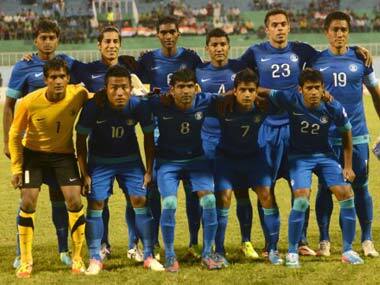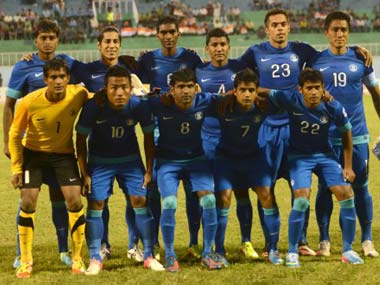This week, while most of the footballing world was gearing up to take part in games which would play a massive part in deciding who would and would not be competing at the World Cup in Brazil next year, the Japanese were entertaining Ghana in the Kirin Cup. Playing at the Yokohama International Stadium, the Samurai Blue displayed a quality that is so vital to success on the football field: bouncebackability. Shinji Kagawa, Yasuhito Endo and Keisuke Honda scored the goals that overturned Frank Acheampong’s first half opener for the Black Stars. But they were only demonstrating a quality that the Japanese have shown time and time again, not just on the football pitch, but in all areas of life. [caption id=“attachment_1104003” align=“alignleft” width=“380”]  The Indian football team which lost in the final of the SAFF Cup to Afghanistan. AFP[/caption] One of the modern world’s biggest incidents stands testament to that. It is very easy to forget that the Japanese are the only people to survive a nuclear holocaust. The nation of Japan had been ravaged during the Second World War but the Japanese worked unflinchingly towards rebuilding their shattered nation. Today, they are one of the world’s biggest manufacturers of automobiles and high-end electronic goods that are as effective as they are affordable. Toyota, Mazda, Suzuki, Mitsubishi, Honda and Yamaha are just a few of the automotive brands that are now present on roads all over the world which display an affordable combination of cutting edge technology and reliability that makes Japanese goods sought after the world over. No matter what the world throws at the Japanese, they always bounce back, and when they do, they return stronger and more resilient for those experiences. On the 11 March, 2011, Japan was hit by what could have potentially been one of the world’s worst nuclear disasters when the Fukushima Daiichi Nuclear Power Plant was struck by a tsunami. It could have led to disaster on the scale of Chernobyl. But the far-sighted Japanese moved quickly to avoid precisely that, showcasing the teamwork, focus and determination that is present in all aspects of their culture. Outside the reactor’s radiation zone, Japanese Red Cross officials quickly set up decontamination showers even before international aid in the form of men, money and material made its way to Japan. As a result of efficient preparation and planning, not one person died from radiation poisoning. When Red Cross officials were handing out two bottles of water to every victim who had been displaced by the disaster, not once was the queue broken by those who had assembled outside the first aid tents. When it was discovered that there were not enough water bottles to go around at two per victim, those who had two bottles gave one to those who had not received water, on their own accord. Four months later, the Japan Women’s National Football Team became the first ever Asian nation to win the World Cup when they beat the United States on penalties. In a show of unanimous support, captain Homare Sawa and the rest of the team dedicated their triumph to the victims of that disaster. Long-term planning is one of the reasons Japan are one of Asia’s best teams. In 1996, as preparation for the 2002 FIFA World Cup which they would be jointly hosting, the Japanese Football Association scrapped their semi-professional league to make way for the professional J-League. Two years later, the Japanese made their first ever appearance in a World Cup when they made it to France. Since then, they have never missed out on qualification and you can always rely on them to get past the group stages without a blemish and challenge for a place in the quarter finals. India could certainly do with the same attitude. The Indians have just come off the back of a 2-0 defeat to Afghanistan, a war-torn nation that has had no peace to speak of since the former USSR invaded in the 1980s. The Japanese have a philosophy called bushido. Originally followed by Feudal Age Samurai who adopted this as the way of the warrior, bushido teaches righteousness, loyalty, respect, honour, courage, benevolence and honesty, all of which when put together essentially puts society first. But in India we tend to put ourselves before society. We wonder what’s in it for us before taking the first step. Those who run Indian football at the top are surely aware of what needs to be done to improve the state of the game. But they are probably wondering what’s in for them. Well, what’s in it for them is that Indian people can finally look at their football team with pride. What’s in it for them is a league that people all over the country actually want to watch. And in the long term, as India’s abysmal FIFA ranking climbs up (Japan are 43rd in the world, first in Asia), seeing an Indian player finally grace one of Europe’s top-flight leagues. That will then lead to a day on which every Indian will sing the national anthem with pride before kick-off. Because they will be watching their team play at its first ever game at the FIFA World Cup.
The Japanese have a philosophy called bushido, which teaches righteousness, loyalty, respect, honour, courage, benevolence and honesty, all of which when put together essentially puts society first.
Advertisement
End of Article
Written by Gautam Viswanathan
Gautam Viswanathan has a very simple dream: he wants to commentate at the finals of the 2022 World Cup in Qatar. A die hard football fan, Gautam's love for the game borders on the fanatical. Give him a choice between an all-expenses paid trip to Europe and Champions League final tickets and he will choose the latter without the slightest flicker of hesitation. see more


)
)
)
)
)
)
)
)
)



